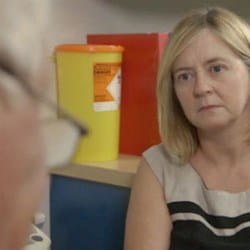AN analysis of newly diagnosed cancer patients found that most were promptly referred from primary care, with a median interval of five days.
Data from over 17,000 newly-diagnosed cancer patients from 439 practices were analysed as part of the National Cancer Diagnosis Audit.
Referral rates were encouraging but the median diagnosis interval was 40 days, still short of the 28-day target. The majority of patients had some investigations in general practice before referral but the audit showed that open access investigations available to GPs, such as endoscopy, were not being used as fully as possible.
Safety netting was recorded for 44 per cent of patients and most (76 per cent) had at least one existing co-morbid condition and 21 per cent had three or more.
The results were published in the British Journal of General Practice.
Professor Helen Stokes-Lampard, Chair of the Royal College of GPs, commented: "This large and comprehensive national audit shows that GPs are doing a good job at identifying patients they suspect of having cancer, and referring them in an appropriate and timely manner – within five days of initial presentation.
"Whilst almost half of patients are being diagnosed within 28 days from referral, where diagnosis took longer, it must be recognised that in the vast majority of cases GPs did not consider the delays to be avoidable.
"Where avoidable delays were reported, the reasons for this were wide-ranging, so whilst they must be addressed, any finger-pointing is not helpful.
"It certainly remains the case that GPs in the UK have some of the worst access to diagnostic tools in the community in Europe. We need better access to both existing and emerging tests and imaging tools that could help us identify cancers, particularly those with symptoms that are more difficult to spot – and we need appropriate training for GPs and our teams to use them effectively.”
This page was correct at the time of publication. Any guidance is intended as general guidance for members only. If you are a member and need specific advice relating to your own circumstances, please contact one of our advisers.
Save this article
Save this article to a list of favourite articles which members can access in their account.
Save to library


